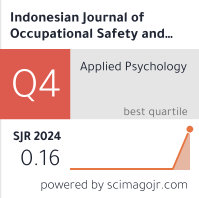Correlation between Individual Characteristics and Work Position with Work Fatigue on Workers
Downloads
Introduction: Work fatigue is a condition of decreased efficiency and resilience of workers, which can interfere the companys' productivity. Job fatigue can be caused by the performance, duration, and effort (work position) of the workers. Based on the observations, workers at the expedition sub units of PT X needed to lift 200 to 400kg heavy loads. The activity of lifting very heavy weights can cause fatigue. One form of physical fatigue indicators is an increase in lactic acid in the blood. The purpose of this study was to analyze the correlation between workers' characteristics and work position with work fatigue among workers in the expedition sub units of PT X. Methods: This research was a quantitative study with a cross sectional design. The population of this study was 36 people. This research used total sampling. The independent variable were individual characteristics and work position as measured using REBA tools, and the dependent variable was work fatigue as measured using lactic acid levels in blood. Data was analyzed using statistical tools to obtain the value of correlation coefficient between variables. Result: The results showed that there was a weak positive correlation between workers' characteristics and physical fatigue. The results showed that the coefficient value between work position and physical fatigue was 0.354. The coefficient figure indicated a weak positive correlation between work position and work fatigue. Conclusion: There was a correlation between work position and work fatigue in workers.
Keywords: ergonomics, lactic acid, REBA, work fatigue, work position
Amalia, N. R., Wahyuni, I. and Ekawati, E. (2017) ‘Hubungan Postur Kerja dengan Keluhan Kelelahan Kerja pada Operator Container Crane PT. Terminal Peti Kemas Semarang', Jurnal Kesehatan Masyarakat (e-Journal), 5(5), pp. 290–298.
Andersen, L. W. (2013) ‘Etiology And Therapeutic Approach To Elevated Lactate', Mayo Clin Proc, 88(10), pp. 1127–1140.
Andreau, O. et al. (2020) ‘Influence of the position and size of various deterministic defects on the high cycle fatigue resistance of a 316L steel manufactured by laser powder bed fusion', International Journal of Fatigue. Elsevier Ltd, p. 105930. doi: 10.1016/j.ijfatigue.2020.105930.
Andriani, R. (2016) Hubungan Antara Indeks Massa Tubuh dan Aktivitas Fisik dengan Volume Oksigen Maksimum. Universitas Muhammadiyah Surakarta.
Annisa, R. N. and Farihah, T. (2018) ‘Analisa Beban Kerja Fisik Sebagai Dasar Penentuan Waktu Istirahat yang Optimal (Studi Kasus Di PT. X)', Integrated Lab Journal, 5(1).
Budhiman, M. A. (2015) Analisis Penilaian Tingkat Risiko Ergonomi Pada Pekerja Konstruksi Proyek Ruko Graha Depok Tahun 2015. Universitas Islam Negeri (UIN) Syarif Hidayatullah.
Eko, N. (2014) ‘Ergonomi Konsep Dasar dan Aplikasi', Surabaya: Prima Printing.
Gandung (2011) ‘Hubungan Sikap Kerja Dengan Kelelahan Kerja Pekerja Laundry Di Kecamatanpurwokerto Utara Kabupaten Banyumas', Jurnal Kesmasindo, 7(3), pp. 209–217.
Gorostiaga, E. M. et al. (2010) ‘Vertical Jump Performance and Blood Ammonia and Lactate Levels during Typical Training Sessions in Elite 400-M Runners', Journal of Strength and Conditioning Research, 0(0), pp. 1–12.
Gorostiaga, E. M. et al. (2014) ‘Blood Ammonia and Lactate As Markers of Muscle Metabolites during Leg Press Exercise', Journal of Strength and Conditioning Research, 28(10), pp. 2775–2785.
Hasibuan, M. S. P. (2016) Manajemen sumber daya manusia. Bumi Aksara.
Hidayah, I. (2018) ‘The Increased of Lactid Acid Concentration in The Blood After Work', The Indonesian Journal of Occupational Safety and Health, 7(2), pp. 131–141.
Jalajuwita, R. N. and Paskarini, I. (2015) ‘Hubungan Posisi Kerja dengan Keluhan Muskuloskeletal Pada Unit Pengelasan PT. X Bekasi', The Indonesian Journal of Occupational Safety and Health, 4(1), pp. 33–42.
Jia, Y., Wang, Y. and Yu, X. (2017) ‘Relationship between blood lactic acid , blood procalcitonin , C-reactive protein and neonatal sepsis and corresponding prognostic significance in sick children', Experimental and Therapeutic Medicine, 14, pp. 2189–2193. doi: 10.3892/etm.2017.4713.
Kurnianto, D. (2015) ‘Menjaga Kesehatan di Usia Lanjut', Jurnal Olahraga Prestasi, 11(2), pp. 19–29.
Leksana, E. (2010) ‘Kadar Laktat sebagai Parameter Resusitasi', Cermin Dunia Kedokteran, 37(7), pp. 545–548.
Lukman, M. S. (2020) ‘Factors Associated with Work Fatigue Symptoms on Bus Service Officers of PT TransJakarta Corridor VI Ragunan', 14(2), pp. 64–68.
Mongkareng, E. R., Kawatu, P. A. T. and Franckie, R. R. (2018) ‘Hubungan Antara Masa Kerja Dan Posisi Kerja Dengan Keluhan Musculoskeletal Pada Pekerja Pembuat Babi Guling Di Kelurahan Kolongan Kota Tomohon', Jurnal KESMAS, 7(5).
Ningrum, D. A. (2012) Perbandingan Metode Hydrotheraphy Massage dan Massage Manual Terhadap Pemulihan Kelelahan Pasca Olahraga Anaerobic Lactacid. Universitas Pendidikan Indonesia.
Putriwijaya, F. D., Berniyanti, T. and Diyatri, I. (2016) ‘Correlation Between Working Positions and Lactic Acid Levels with Musculoskeletal Complaints among Dentists', Dental Journal (Majalah Kedokteran Gigi), 49(4), pp. 201–205.
Sari, D. N., Endardjo, S. and Santoso, D. I. S. (2013) ‘Blood lactate level in Wistar rats after four and twelve weeks intermittent aerobic training', Med J Indones, 22(3), pp. 141–145. doi: 10.13181/mji.v22i3.582.
Setiadi, K. (2015) Hubungan Antara Usia dan Indeks Massa Tubuh dengan Kadar Asam Urat pada Remaja di SMA Negeri 1 Samarinda. Sekolah Tinggi Imu Kesehatan Muhammadiyah.
Setyawati (2010) Selintas Tentang Kelelahan Kerja. Yogyakarta: Asmara Books.
Sugiyono (2008) ‘Metode Penelitian Kuantitatif Kualitatif dan R&D'. Jakarta-Indonesia.: CV. Alfabeta, Bandung.
Sulaiman, F. and Sari, Y. P. (2016) ‘Analisis Postur Kerja Pekerja Proses Pengesahan', Jurnal Teknovasi, 3(1), pp. 16–25.
Suma'mur (2009) Hiegine Perusahaan dan Keselamatan Kerja. Jakarta: CV Sagung Seto.
Tarwaka (2014) ‘Keselamatan dan Kesehatan Kerja "Manajemen dan Implementasi K3 di Tempat Kerja”'. Surakarta: Harapan Press, Surakarta.
Umyati (2010) Faktor Faktor Yang Berhubungan Dengan Kelelahan Kerja Pada Pekerja Penjahit Sektor Usaha Informal Di Wilayah Ketapang Cipondoh Tangerang Tahun 2010. Universitas Islam Negeri Syarif Hidayatullah.
Widiastuti, S. and Dieny, F. F. (2015) ‘Faktor Determinan Produktivitas Kerja Pada Pekerja Wanita', Jurnal Gizi Indonesia (The Indonesian Journal of Nutrition), 4(1), pp. 28–37.

In order to be accepted and published by The Indonesian Journal of Occupational Safety and Health, Author(s) who submit an article should complete all the review process. The copyright of received articles assigned to the The Indonesian Journal of Occupational Safety and Health and Department of Safety and Health, Universitas Airlangga as publishers of the journal. The intended copyright includes the rights to publish articles in various forms (including reprints).
The Editorial Team of The Indonesian Journal Of Occupational Safety and Health and Department of Safety and Health strive to ensure that no errors occur in the articles that have been published, both data errors and statements in the article.
Users of this website will be licensed to use materials from this website following the Creative Commons Attribution-NonCommercial-ShareAlike 4.0 International License. No fees charged. Please use the materials accordingly.
------------------------------------------------------------------------------------------------------------------------------------------------------------------------------------------
Attribution ” You must give appropriate credit, provide a link to the license, and indicate if changes were made. You may do so in any reasonable manner, but not in any way that suggests the licensor endorses you or your use.
NonCommercial ” You may not use the material for commercial purposes.
ShareAlike ” If you remix, transform, or build upon the material, you must distribute your contributions under the same license as the original.







 How to Submit Articles in OJS
How to Submit Articles in OJS

























